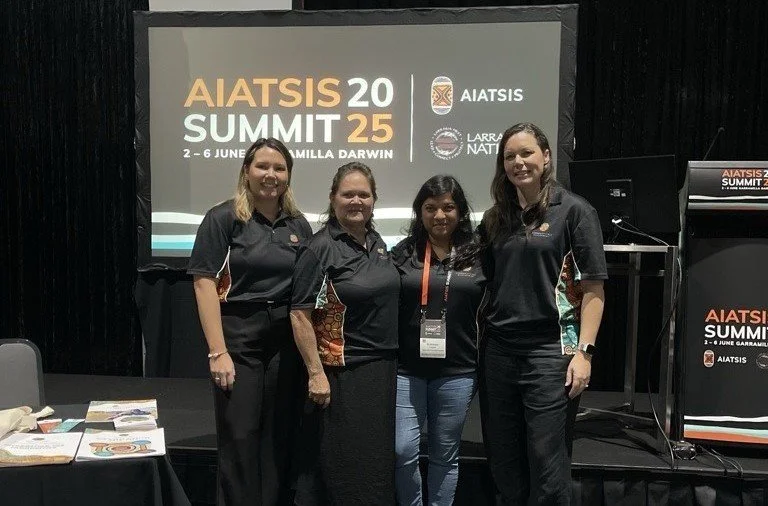AIATSIS Summit 2025: working and learning together
Our team was proud to be at the AIATSIS Summit on Larrakia Country. Left to right: Deputy CEO, Renee, Regional Manager, Tania, Senior Manager Impact and Strategy, Ansuya, General Manager Impact and Strategy, Sharon.
What makes empowered peer-learning such a powerful force in community development?
In a peer-learning session, practitioners reflect and share stories about what’s working (and what hasn’t) in their diverse experiences.
Everyone is both a learner and a teacher and real experiences are just as important as formal training.
This leads to stronger community support.
When practitioners are better supported, more connected, and continuously learning from each other, they are better equipped to support the communities they serve.
The AIATSIS summit
This is what our team presented on at the recent Australian Institute of Aboriginal and Torres Strait Islander Studies (AIATSIS) Summit. They shared how our regular ‘Community of Practice’ sessions focus on peer-learning in a positive, structured, and ongoing way.
Our team had an incredible week connecting with mob from across the country and listening to important discussions around this year’s theme ‘Voices of Empowerment: Strengthening our Future’.
It pays tribute to a world in which Aboriginal and Torres Strait Islander peoples' rights, knowledge, and voices are recognised, respected, and valued by all Australians today and tomorrow.
“As a first-time AIATSIS conference attendee, the opportunity to listen and more deeply understand the context in which we work was enriching. The experience also provided ample opportunity to build relationships within our sector, and to connect to Country in Belyuen. Tania and I were grateful to share with our peers Community First Development’s commitment to learning through reflexive practice.”
How yarning and knowledge sharing leads to collective ownership
Regional Manager, Tania, and Senior Manager Impact and Strategy, Ansuya, presented a well-attended session on ‘Empowered peer-learning on community development: How yarning and knowledge sharing leads to collective ownership’.
As an organisation, we use Learning and design groups to inform and improve our practice. At different times groups of people work together to explore how we create change, and each of these groups has a story to tell – our approach is people-based, with relationships and respect at the heart. Learning and design groups are used to undertake any organisational development work—nothing is done in isolation. This has enabled us to undertake clever design work around our Community Development Framework, our database, our research, our publications. Our latest focus is to investigate the role of formal learning within these groups.
Every six weeks, our community development practitioners gather online for our ‘Community of Practice’ sessions to reflect and share learnings, yarn about challenges and successes, and share their own experiences and ideas. It’s a safe, learning environment where they support each other to improve their practice, to build on what they’re already doing, so it works better and has greater impact.
“We encourage having open conversations and sharing experiences to support the team in having a shared sense of responsibility and pride in the work they do. A collective ownership of solutions and outcomes. A collective investment in each other’s successes and challenges. ”
As a national community development and research organisation, we’re committed to thinking deeply about our own actions, decisions, and role in communities and how they affect others and outcomes. Because for us, it’s about providing First Nations’ communities the tools, skills, confidence, and opportunities to make decisions and take action to improve their own lives.
How are the sessions facilitated?
In our sessions, we focus on peer-learning through interactive methods such as open yarns, whiteboards, polls, and sharing stories of good practice to facilitate a collaborative learning environment. Learning from and with each other. We also invite volunteers and community members to relevant sessions to share their stories, experiences and join the learning overall.
For each session a theme, or challenge is identified ahead of time, and staff are invited to share First Nations’ community development knowledge, reflections and innovative solutions. Sessions cover topics across a range of community development practices, often with a focus on monitoring and evaluation and how it can be used to keep community projects on track.
It’s not just about doing the work, but also stepping back to reflect on how our values, role, and cultural backgrounds may shape what we're doing and how others experience it.
These sessions are an opportunity to find the most respectful and effective ways to support communities.
We acknowledge and celebrate the breadth of knowledge, culture, language groups, professional roles and experience that exists within our team.
And ultimately, this strengthens how we work together across regions and builds a shared responsibility for the work we do.
Get in touch!
This approach may have relevance for other organisations and governing bodies. If you would like to learn more, please contact us.

